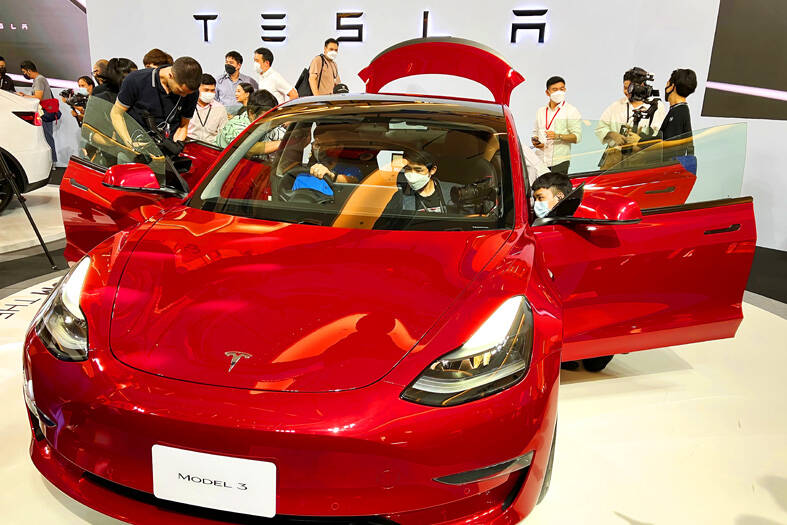Tesla Inc has launched sales in Thailand, offering its popular Model 3 and Model Y at prices aimed at competing with rivals such as China’s BYD Co (比亞迪).
Tesla yesterday staged a glitzy showcase of its plans at Bangkok’s Siam Paragon shopping mall. Online purchases have begun, with plans to deliver vehicles to buyers in the first quarter of next year.
Southeast Asia’s market of more than 600 million consumers is increasingly a focus for automakers looking to expand sales, especially of electric vehicles (EVs).

Photo: AP
Tesla said the vehicles would have the latest satellite navigation systems and other features such as over-the-air software updates.
The company is selling its Model 3 Long Range and Performance models, while the Model Y would be sold in three versions “to meet the specific demands of the EV lifestyle for every Thai driver,” the company said.
Prices are to range from 1.76 million baht to 2.5 million baht (US$50,218 to US$71,332), it said.
Tesla is to open its first service center and supercharger station in Thailand by March, and plans to have at least 10 set up in the country next year, it said.
Apart from Tesla and BYD, Nissan Motor Co has made Thailand a regional EV hub, while Mercedes-Benz Group AG says it is due to announce sales of its EQS450+ soon.
Nithi Thuamprathom, an auto expert for Auto Life Thailand, said Tesla’s launch would likely give the EV market in Thailand a big boost, largely thanks to its competitive pricing and brand value, which is an advantage over Chinese automakers like BYD.
“It’s unbelievable that Tesla announced the entry price [of its cheapest model] at 1.7 million Thai baht,” he said. “That’s the price of Japanese cars with combustible engines or hybrid engines. This will create such a big change in the market.”
Still, Thailand remains mainly a land of gasoline, diesel and liquefied petroleum gas-fueled vehicles, even as a nationwide network of charging stations expands.
“The EV trend is growing in Thailand and there is an increase in the consumer acceptance, but we have to accept that this is just a beginning,” Nithi said. “It’s in a pioneering stage.”

RUN IT BACK: A succesful first project working with hyperscalers to design chips encouraged MediaTek to start a second project, aiming to hit stride in 2028 MediaTek Inc (聯發科), the world’s biggest smartphone chip supplier, yesterday said it is engaging a second hyperscaler to help design artificial intelligence (AI) accelerators used in data centers following a similar project expected to generate revenue streams soon. The first AI accelerator project is to bring in US$1 billion revenue next year and several billion US dollars more in 2027, MediaTek chief executive officer Rick Tsai (蔡力行) told a virtual investor conference yesterday. The second AI accelerator project is expected to contribute to revenue beginning in 2028, Tsai said. MediaTek yesterday raised its revenue forecast for the global AI accelerator used

Taiwan Semiconductor Manufacturing Co (TSMC, 台積電) has secured three construction permits for its plan to build a state-of-the-art A14 wafer fab in Taichung, and is likely to start construction soon, the Central Taiwan Science Park Bureau said yesterday. Speaking with CNA, Wang Chun-chieh (王俊傑), deputy director general of the science park bureau, said the world’s largest contract chipmaker has received three construction permits — one to build a fab to roll out sophisticated chips, another to build a central utility plant to provide water and electricity for the facility and the other to build three office buildings. With the three permits, TSMC

TEMPORARY TRUCE: China has made concessions to ease rare earth trade controls, among others, while Washington holds fire on a 100% tariff on all Chinese goods China is effectively suspending implementation of additional export controls on rare earth metals and terminating investigations targeting US companies in the semiconductor supply chain, the White House announced. The White House on Saturday issued a fact sheet outlining some details of the trade pact agreed to earlier in the week by US President Donald Trump and Chinese President Xi Jinping (習近平) that aimed to ease tensions between the world’s two largest economies. Under the deal, China is to issue general licenses valid for exports of rare earths, gallium, germanium, antimony and graphite “for the benefit of US end users and their suppliers

Dutch chipmaker Nexperia BV’s China unit yesterday said that it had established sufficient inventories of finished goods and works-in-progress, and that its supply chain remained secure and stable after its parent halted wafer supplies. The Dutch company suspended supplies of wafers to its Chinese assembly plant a week ago, calling it “a direct consequence of the local management’s recent failure to comply with the agreed contractual payment terms,” Reuters reported on Friday last week. Its China unit called Nexperia’s suspension “unilateral” and “extremely irresponsible,” adding that the Dutch parent’s claim about contractual payment was “misleading and highly deceptive,” according to a statement